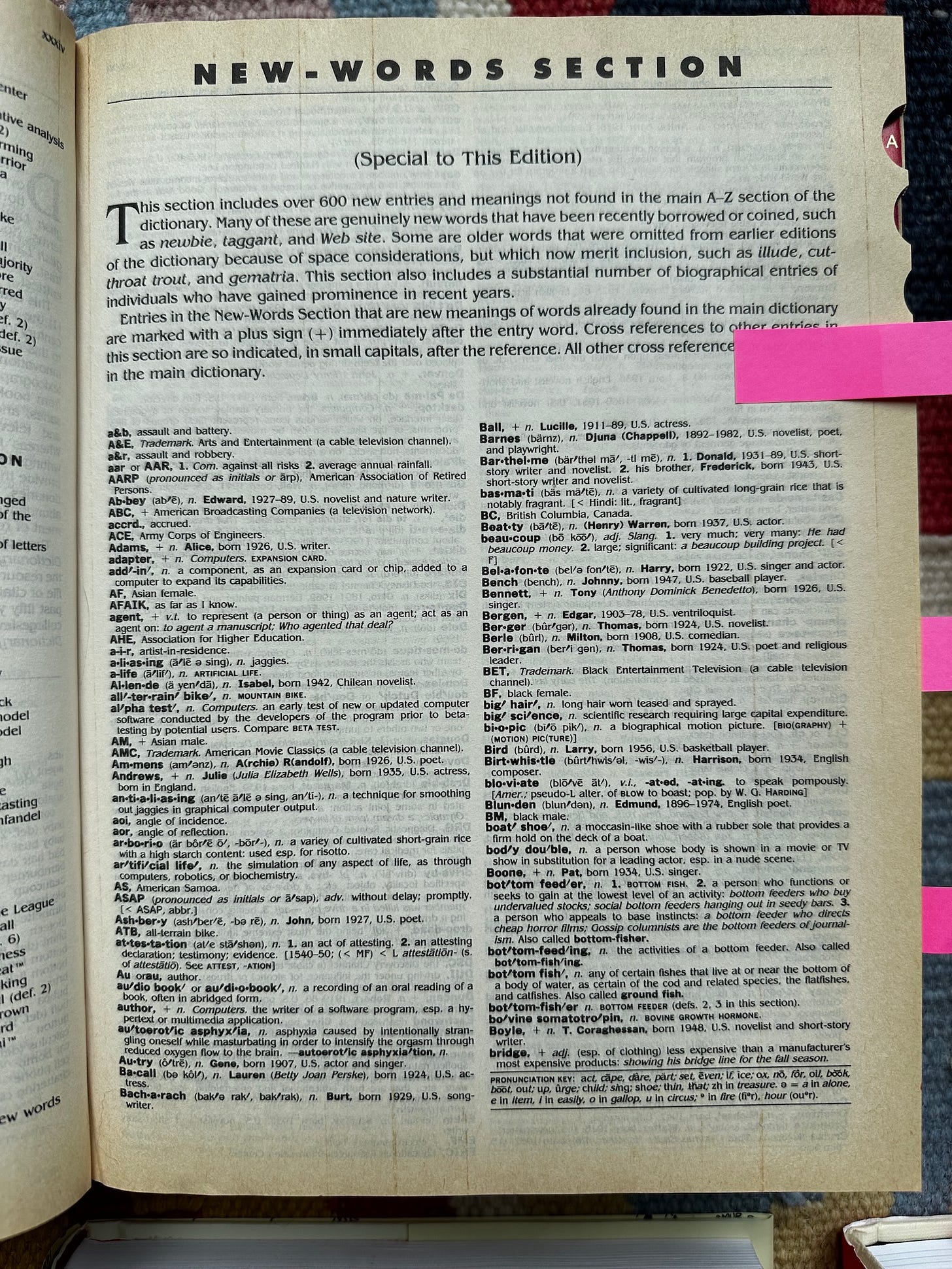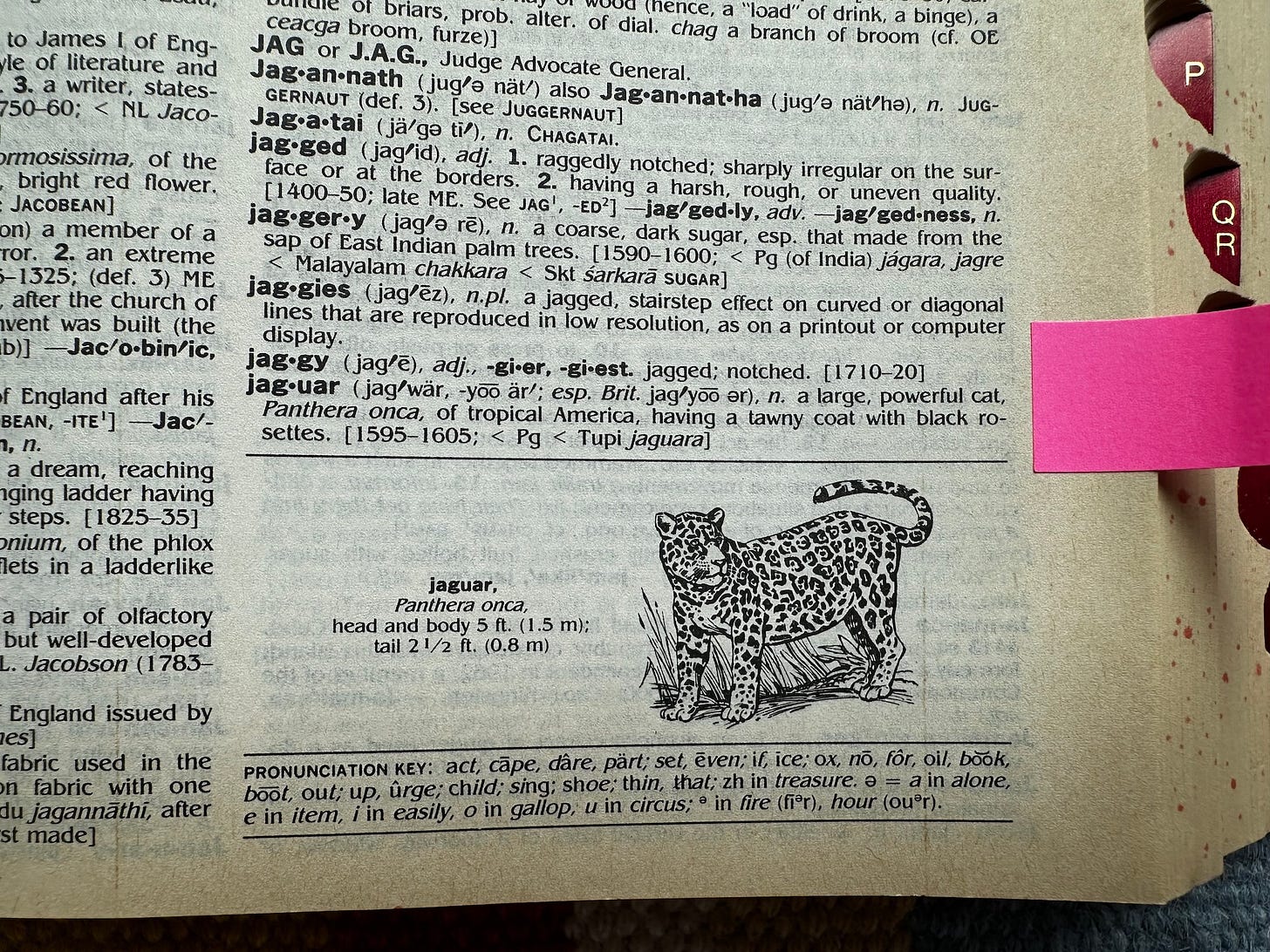Hypotheticals, Lexicals, Artificials
What If; giant old dictionaries; AI for travel planning and drafting
Dear Raisers of radical readers,
School just let out for summer, so we’re facing the expansive wilderness of Routine Absentia. It will be a long and arduous journey, but we will make it through! We begin with a week of stark nothingness, fully indulgent unplanned time. This is risky, yes, but I think the kids are finally old enough to experience a week of summer as we knew it in the 90s, free of camps and carefully managed time. Then we’ll spend a few weeks traveling, first to visit family far from home, then further still to places we’ve never been. Theoretically there should be something for everyone and all needs will be met, BUT of course it’s foolhardy to think the antidote for routine-absentia-sickness would be travel. Obviously jet-lag and culture-shock will only compound the inevitable acute boredom syndrome. And yet, go we shall! On return, there will be a bit more nothingness as we re-acclimate, and then a couple of camps that are EXACTLY what the kids asked for, but whose real quality is uncertain and suspect. 🙄 It’s not an unreasonable position, to be skeptical. How could ANY summer plans possibly meet the heavenly vision promised by the lore? I guess that in itself is an important part of summer. Not just the boredom, but the realization that summer is not some magical time of Kool-Aid and and floaties. It’s just days – they’re all just days. [As I write this, in early June, it is still foggy at 9am in San Francisco. It’s quite possible that summer melancholy is a regional affliction.]
ANYWAY, I have three bookish/writerly recommendations as we wade into the uncertain depths of summer. Bear in mind, the children are getting older, like they do; you’ll see that in the selections here.
What If, Randall Munroe
vol 1 (2024) libraries, bookstores
vol 2 (2022) libraries, bookstores
You might be a long-time reader of the XKCD webcomic, or maybe you picked this book up on its first release 10 years ago. Both volumes give serious scientific consideration to a huge variety of impossible “what if”s posed by readers (some are kids, most are probably adults). Although the answers often involve a lot of complex math, Munroe summarizes his calculations in a way that is accessible for all readers. My 8-yo was thoroughly delighted by the Fermi estimation of the human body, and he has plowed through both volumes. For kids who are intrigued by explosions, mayhem, and risky scenarios in general, these books say, “I see you.” Both editions include excellent illustrations.
Really old dictionaries
Big and heavy, printed and bound, thin paper. Bonus points for index notches. Hear me out: a dictionary is a Time Machine that is complete on publication and obsolete immediately after. Just about everything is rendered in a few brief lines. A dictionary offers endless opportunities to learn more AND to see where YOU know more. Sure, they’re useful for spelling or to provide quick clarity, but they’re also excellent vehicles for bibliomancing or bliss-browsing (THAT is the antidote for doom-scrolling). I grabbed TWO giant Websters from a free library in our neighborhood last week. One was published in 1996, and the other in 1981 (my birth year). I was delighted to see them because I haven’t seen a ginormous dictionary with thumb tabs in the shops recently, and I have great memories of flipping through my mom’s enormous, dark green dictionary as a kid. I remember turning the pages with closed eyes, landing a finger blindly, and then interpreting what I’d divined. I also remember looking up, er, “adult” words and sometimes feeling exhilarated and other times feeling confused or let down. In any case, I always wanted to know more. I heard from our elementary school principal that they have a bunch of old dictionaries they are trying to re-home. If you have trouble finding a big, notched dictionary, you could try asking a local school. You’ll definitely find them online, but maybe it’s more fun to walk through your town and see what you can find at used bookstores or the thrifts. Maybe this could be an adventure for a day or two with any kids you might be minding. Depending on their age, it could be fun to give your kid a little cash and send them into a Salvation Army and see if they can find and buy a dictionary, but of course, only if it’s BIG and OLD and ideally NOTCHED.
AI for travel planning and drafting
This is more of a share than a rec. I use AIs a lot for work (we just launched a festival-finding tool built with a bunch of them – Festivo), so I spend a lot of time thinking about their strengths and limitations. Recently I took a swing at using ChatGPT to assist with our summer travel planning. It was helpful, imperfect, and definitely demonstrated some important lessons that I’ve shared with the kids. I asked for help considering two possible destinations. Here is a list of the kind of information I provided in my prompting:
The destinations or plans you're trying to decide between
When you want to go
Ages of kids
Relevant previous experience or skills (languages spoken, previous/similar visits)
Desired length of trip/itinerary
Pacing and transit preferences
Budget guidelines
Kids' general interests
Adults' general interests
Any political/ethical/medical considerations
After a short conversation establishing our needs and interests, and discussing the potential destinations, I asked ChatGPT to create a brief summary of the two locales, as well as a worksheet all family members could use to help us make a decision about where to go. This is what came out of that process:
Later in our trip-planning process (after much book reading, reddit searching, and asking people we know for advice), I used ChatGPT again to create a booklet version of our final itinerary for the kids. My big lesson here won’t surprise you – you should really write your own content. In my prompt, I asked Chat to help me summarize our plans (which I provided) in a way that would help our skeptical kids to get excited about and understand the flow of our trip. I instructed it to simplify the information, while not talking down to the kids. It produced a draft that looked pretty good to me at first. I printed two copies and reviewed it with the kids over lunch, and they both basically tore it up. Our 11-yo resented all the references to magical and secret stuff, and our 8-yo mirrored our 11-yo’s attitude. It was too fluffy, too generically kid-ified. But the structure and hard details were OK, so I re-wrote all the narrative in my own voice. The kids didn’t give me a gold star for my re-edit, but the de-fluffed version no longer makes them actively angry. So… that’s a win.
I think a lot about what it will be link when my kids begin using AIs on the regular (their exposure has been quite limited so far), and I’m glad for this opportunity to talk with them about the importance of verifying and extending the information an AI serves, and the imperative to write your own work, because your readers will absolutely know if they’re being bullshitted.













